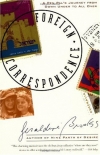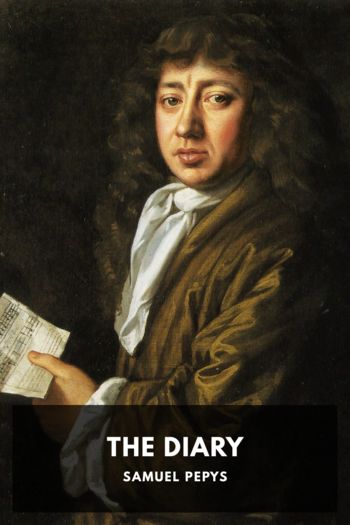Foreign Correspondence: A Pen Pal's Journey by Geraldine Brooks (finding audrey .TXT) 📗

- Author: Geraldine Brooks
Book online «Foreign Correspondence: A Pen Pal's Journey by Geraldine Brooks (finding audrey .TXT) 📗». Author Geraldine Brooks
Of course. Written Hebrew leaves out many vowels. Amme was young Cohen’s best try at transliterating the Hebrew word Amami:
A woman answered. Her voice had the quaver of old age. I asked for Cohen in halting Hebrew.
“Ma?” she said. “What? Who wants him?”
I told her Geraldine Brooks, from Australia.
“Jordan Books?” she said, her voice rising with a tinge of alarm. I think she thought I was an Arab publisher. I passed the phone to my helper. His solution to the communication problem was to repeat what I’d said, louder.
“OUR-STRAW-LIAR!” he bellowed.
“Australia,” I prompted.
“You’re calling all the way from Australia?”
“No! From here, at the Town Hall.” The woman, even more confused, muttered something grumpily. “She says the Cohen you want doesn’t live there.” Disappointment clouded my face. But my translator pinched his fingers together again, in the “Wait a minute” gesture. He listened for a moment, took a pen, scribbled, then put down the phone. “It might be her son. She gave me his number in Netanya.” Netanya, a bigger town, lay just a few miles farther north. “But she said he can’t know you, because he doesn’t speak English.”
Could Cohen’s mother not realize her son had known enough English to correspond in the language? It seemed unlikely, but the scrawled phone number was the only lead I had. I decided to call it while I still had a Hebrew-speaker on hand. We dialed. No answer. There was nothing to do but thank my helper and head back down the coast to my hotel.
From my room, I tried the number again. This time a younger woman answered, switching quickly from Hebrew to English as she heard my accent. Yes, she said, Cohen lived there. She called him. In Hebrew, I heard her warning him, “She’s speaking in English.”
Then he was on the line, the disembodied voice of the boy who was the repository of so many teenage fantasies. It was a deep voice, thickly accented with the heavy gutturals of Hebrew-speakers who don’t have much practice with English. I tried to explain who I was. His reply, after a long silence, was grave and guarded. Yes, he agreed, he was the Cohen who had lived on Amami Street.
“But I don’t remember you,” he said.
“Well,” I said, “it’s a while ago. You were sixteen.”
“I was sixteen? But now I’m forty-one!” Silence again. Then, finally, “I don’t know what to say.” I told him I’d like to meet him. There was yet another long silence. “Why?” he asked. “Why, after so much time?”
It was a question I barely knew how to answer. How could I explain to this taciturn stranger who didn’t even remember me that he was part of a fantasy-obsession that shaped my life? I mumbled something about having recently found his letters and wanting to meet him at last. “I’ll have to think about it,” he said. He took my number and hung up, without even saying goodbye.
I put the phone down, the euphoria of the early evening turned to discouragement. As I tried to sleep, my mind again started spinning scenarios for Cohen, just as I had as a fifteen-year-old. Maybe he was a Mossad agent, and he needed to have me checked out.
I had worried about the logistics of finding my pen pals. It hadn’t occurred to me that they might not want to be found.
I was in a heavy jet-lagged sleep when the phone rang at 9 A.M.
“Good morning, how are you?”
It was Cohen, his voice transformed from cold suspicion to friendliness. In the background was the sound of jangly machinery and many people talking. “Can you be at your hotel at 2 P.M. today? Good. I’ll come there,” he said, and rang off.
Elated, I wandered down to breakfast, my favorite meal in Israel. I loaded the plate with yogurt, cucumber, tomato and smoked fish—an array of foods I’d never dream of eating early in the morning anywhere else—and settled down in a sun-splashed corner of the dining room with a copy of the Jerusalem Post. On page 3 there was a story about the effort under way to refill the Hula Swamp. It seemed that the Zionist pioneers had died of malaria and exhaustion in order to perpetrate an environmental atrocity. Now, modern Israel was anxious to redress it.
It was always hard to fathom the pace of change in Israel. The last time I had eaten breakfast in the dining room of that beachside hotel, all the waiters had been Israeli Arabs and the whispered buzz between them as they tidied the buffet and cleared the tables was the gentle murmur of Arabic. Now the staff was entirely Russian, and the muttered words were “Da, nyet, horosho.” The last time I was there, Arafat had been a hated terrorist in faraway Tunis. Now he was down the highway in Gaza and as much a part of the domestic political landscape as any other outspoken Israeli mayor.
To fill the hours before the meeting with Cohen, I called some correspondent friends in Jerusalem. One of them, an Australian TV reporter, was just back from six weeks home leave in Sydney. She was curious about my pen pals, and I explained that I acquired them because, at the time I was growing up, Sydney felt like the ends of the earth.
“It still feels like the ends of the earth, matie,” she said. “For one thing, there’s the length of the flight and the feeling that you’re getting out at the world’s last stop. And then you turn on the TV and there’s a whole program about someone who’s had a possum piss in their ceiling and can’t claim it on insurance. You find yourself thinking, ‘If I stay here another six weeks, will I care about that possum, too?’ ”
I understood why Australia felt remote to her.





Comments (0)